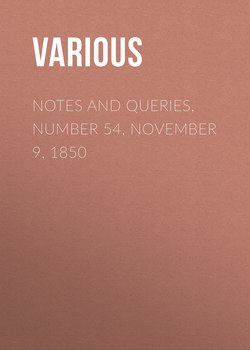Читать книгу Notes and Queries, Number 54, November 9, 1850 - Various - Страница 2
Notes
MISPLACED WORDS IN SHAKSPEARE'S TROILUS AND CRESSIDA
ОглавлениеIn that immaculate volume, the first folio edition of Shakspeare, of which Mr. Knight says: "Perhaps, all things considered, there never was a book so correctly printed"! a passage in Troilus and Cressida, Act. v. Sc. 3., where Cassandra and Andromache are attempting to dissuade Hector from going to battle, is thus given:
"And. O be perswaded: doe not count it holy,
To hurt by being iust; it is lawful:
For we would count giue much to as violent thefts,
And rob in the behalfe of charitie."
Deviating from his usual practice, Mr. Knight makes an omission and a transposition, and reads thus:
"Do not count it holy
To hurt by being just: it is as lawful,
For we would give much, to count violent thefts,
And rob in the behalf of charity."
with the following note; the ordinary reading is
"'For we would give much to use violent thefts.'"
To use thefts is clearly not Shakspearian. Perhaps count or give might be omitted, supposing that one word had been substituted for another in the manuscript, without the erasure of the first written; but this omission will not give us a meaning. We have ventured to transpose count and omit as:
"For we would give much, to count violent thefts."
We have now a clear meaning: it is as lawful because we desire to give much, to count violent thefts as holy, "and rob in the behalf of charity."
Mr. Collier also lays aside his aversion to vary from the old copy, and makes a bold innovation: he reads,—
"Do not count it holy
To hurt by being just: it is as lawful,
For us to give much count to violent thefts,
And rob in the behalf of charity."
Thus giving his reasons: "This line [the third] is so corrupt in the folio 1623, as to afford no sense. The words and their arrangement are the same in the second and third folio, while the fourth only alters would to will." Tyrwhitt read:
"For we would give much to use violent thefts,"
which is objectionable, not merely because it wanders from the text, but because it inserts a phrase, "to use violent thefts," which is awkward and unlike Shakspeare. The reading I have adopted is that suggested by Mr. Amyot, who observes upon it: "Here, I think, with little more than transposition (us being, substituted for we, and would omitted), the meaning, as far as we can collect it, is not departed from nor perverted, as in Rowe's strange interpolation:
"For us to count we give what's gain'd by thefts."
The original is one of the few passages which, as it seems to me, must be left to the reader's sagacity, and of the difficulties attending which we cannot arrive at any satisfactory solution."
Mr. Collier's better judgment has here given way to his deference for the opinion of his worthy friend; the deviation from the old copy being quite as violent as any that he has ever quarrelled with in others.
Bearing in mind Mr. Hickson's valuable canon (which should be the guide of future editors), let us see what is the state of the case. The line is a nonsensical jumble, and has probably been printed from an interlineation in the manuscript copy, two words being evidently transposed, and one of them, at the same time, glaringly mistaken. The poet would never have repeated the word count, which occurs in the first line, in the sense given to it either by Mr. Collier or by Mr. Knight.
Preserving every word in the old copy, I read the passage thus:—
"O! be persuaded. Do not count it holy
To hurt by being just: it is as lawful as
(For we would give much) to commit violent thefts
And rob in the behalf of charity."
"To count violent thefts" here would be sheer nonsense; and when we recollect how easy it is to mistake comit for count, the former word being almost always thus written and often thus printed, we must, I think, be convinced that in copying an interlineated MS., the printer misplaced and misprinted that word, and transposed as, if the repetition of it be not also an error.—"For," commencing the parenthesis, "we would give much" stands for cause. The emphasis should, I think, be laid on for; and commit be accented on the first syllable. Thus the line, though of twelve syllables, is not unmetrical; indeed much less prosaic than with the old reading of count.
This correction, upon the principle which governs Messrs. Collier and Knight, and which indeed should govern all of us,
"To lose no drop of that immortal man,"
ought to be satisfactory; for it is effected without taking away a letter. The transposition of two evidently misplaced words, and the correction of a letter or two palpably misprinted in one of them, is the whole gentle violence that has been used in a passage which has been, as we see, considered desperate. But, as Pope sings:
"Our sacred Shakspeare,—comprehensive mind!
Who for all ages writ, and all mankind,
Has been to careless printers oft a prey,
Nor time, nor moth e'er spoil'd as much as they;
Let the right reading drive the cloud away,
And sense breaks on us with resistless day."
Periergus Bibliophilus.
October, 1850.
